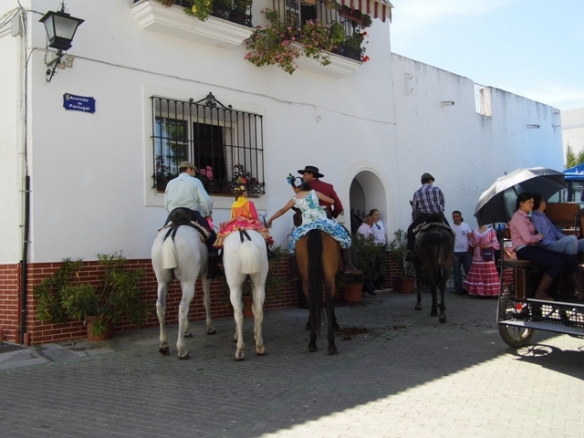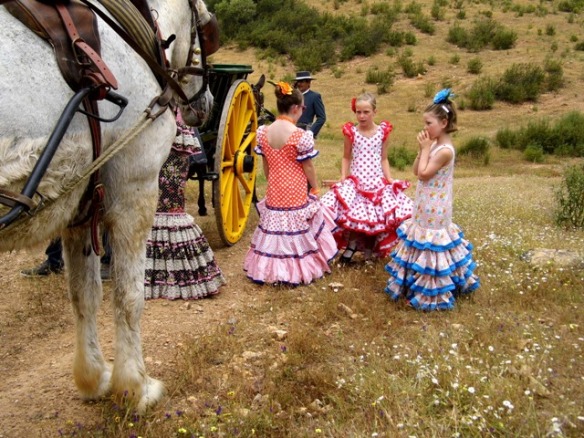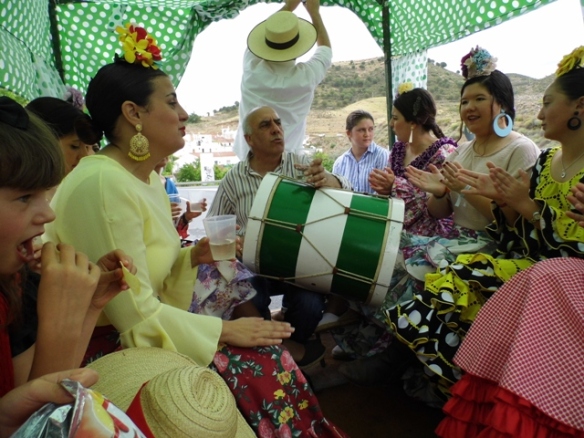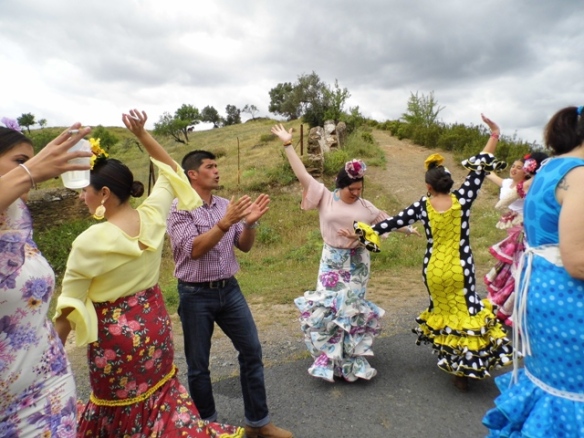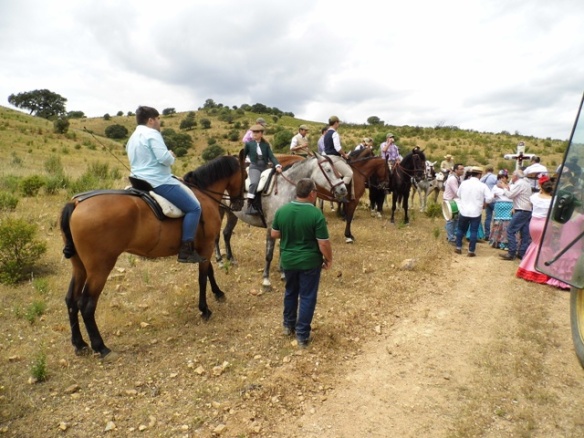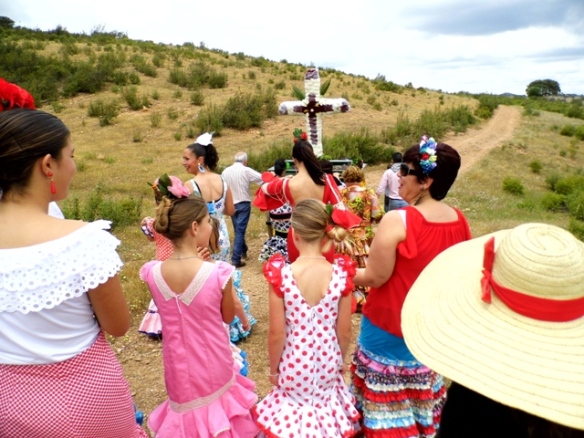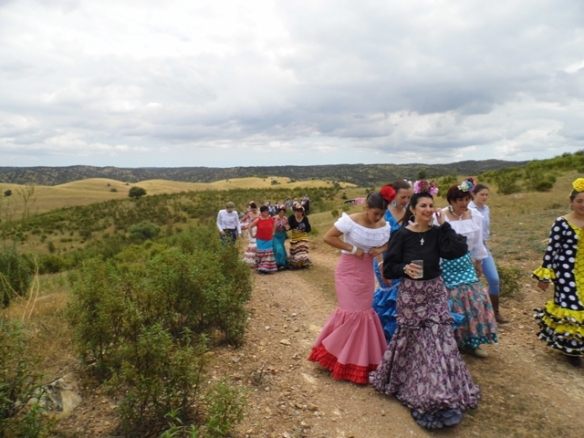by Julian
Wednesday 23rd May 2018. Sanlúcar de Guadiana, Spain
This was not a special day on the Rio Guadiana. Normal weather, no fiestas. But I had agreed to work for Manuel, an old gentleman who wants to run boat trips in a large motor boat that has seen better days. He is short and perfectly spherical. Manuel cannot see very well and needs someone to drive and do other tasks that he no longer has the dexterity or fitness to do. I have been working for him on and off for the past few weeks. Martina had decided to go shopping in Villa Real and had left just before the girls got up and I had to get them ready for school.
Normally, getting Lily and Katie ready for school is a gargantuan task, which inevitably involves repeated commands and some screaming. However, when on my own, I think the girls realise my general lack of competence and get ready without expecting an adult to assist them. So it was that the girls were ready a full 20 minutes before we had to leave the boat. This was good because I had to take them to Reme’s shop before school to buy an exercise book which Lily needed.
Less than a minute after dropping the girls to school I am standing outside Manuel’s house. He tosses me the keys to his aging Mercedes. “Donde vamos?” I ask.
“Isla Cristina.” I wrestle the heavy, four geared vehicle, along the steep spaghetti roads leading out of town. Isla Cristina is 44 km away and Manuel and I have been there several times. I take Manuel to the usual spot, near the chandleries and fishing boats. But instead of going into a shop, Manuel whips out a business card and starts asking people for directions. We drive on, periodically stopping along all manner of strange, one-way, semi-pedestrian streets, to the sound of the honking horns of frustrated drivers and the fist waving curses of Manuel as he asks anyone and everyone where the heck this place is. After driving around the whole of the town we end up back where we started. We take a turn down a side road, barely wide enough for the Mercedes. It does not look promising and ends in a dead end. It turns out to be the street mentioned on the business card but there is no sign of any business, or really anything. I leave Manuel talking to some people in a carpenter’s workshop on the next street. I return to find they have been joined by one of the most eye-catching men I have ever seen. He is nearly my height, with a tight black top which displays his enormous muscles to good effect, skin tight ripped jeans, dark skin and a well-groomed beard. I start to mentally refer to him as “The Rock.”
We walk back to the car. The Rock follows us. “Venga!” states Manuel and we get into the car. Disturbingly, The Rock climbs into the back seat. “Sanlúcar” orders Manuel. What! For what purpose are we bringing this mass of human perfection back home to our tiny village.
I drive the 44km back to Sanlúcar. We take The Rock down to the pontoon and he inspects the wooden bench we have constructed over the previous few days along the back of Manuel’s boat. The men who work at the zip wire office, with their gym crafted bodies, stare down at him, with obvious muscle envy. After 20 minutes, the three of us climb back into the Mercedes and I drive the 44km back to Isla Cristina and back to the anonymous side road, where The Rock produces a key and opens a large grey metal door. We all walk inside. My jaw drops as I stare around the workshop. Broken chairs and settees surround us. The Rock is an upholsterer! Manuel leafs through a samples book and selects an outdoor seat cover in pink. The Rock explains that this is one of the more expensive materials, but they both seem to agree that it is worth the money. Then the haggling starts. Not about the cost. Manuel wants the job done tomorrow. Not possible! The foam and the cover would have to be ordered. Friday? No there is other work to do, it would have to be the end of next week. Manuel counts the days on his fingers. No good, too long. The Rock is getting exasperated, but Manuel will simply not back down. “Where do we get the materials from?” he asks.
“Seville.” Comes the reply, with a shrug emphasising the impossibility.
“Only Seville!” Manuel is beaming “Now if you’d said Barcelona that would be different, but Seville, easy!” They both turn and look at me expectantly.
“But I can’t … I have to be in Sanlúcar at two o’clock … pick my daughters up from school … make lunch … Martina is in Portugal … I have a Skype interview for a teaching job in England at three o’clock … I can’t do anything until at least four.” The pair of them discuss this. I don’t understand a word they are saying. Manuel and I climb back into the car and drive back to Sanlúcar once again. It is a quarter to two. “I’ll meet you here at the bar at four” says Manuel “The earlier you can make it the better.” Damn! The pressure is on big time.
I phone Martina. “Hi darling, have you had a good time?”
“Yes, I’m sitting in a lovely Italian restaurant with pizza and a glass of wine. I’ve finished all the shopping.”
“So, you’ll be back on the early bus then?”
“Yes.”
“Great, that means the kids will only be on their own for half an hour. I have to go to Seville.”
“!!!”
“I’ll put them watching a movie. They’ll be fine.”
A pile of salami and salad rolls are hastily shoved in front of the children. “Daddy’s very busy … You can eat the strawberries … Any rolls you don’t want put in this bag and have them later … There’s the computer … The hard drive with the movies … Yes, you can watch anything you like … Here’s a jug of water … If you need me I’ll be in the beach bar until four … Mummy’s back at four thirty … be good … don’t hit each other.”
This might be classed as irresponsible parenting but this is a very small village. Lily and Katie know everyone and everyone knows them. Within certain boundaries they have freedom to run around the place with their friends. I will be able to see them from the bar where I will be taking my Skype call. Rosa is always available as an adult point of contact for the short period when we aren’t in the village. But really, the village is full of responsible adults, many of whom have had our children round for lunch, or even a sleep-over, and vice versa their children with us.
I quickly pull on a shirt. Skype won’t show up my paint covered work shorts and sandals. I go up to the shower block. Great, my beard isn’t too bad, no need to trim. Clean my teeth, splash some water in my face, comb my hair. I’m in the bar with ten minutes to spare. Five minutes later I still cannot get the internet connection. Shit, I’ve got no time. I run to Jeanne and David’s house and ask if I can use their internet. They have changed their internet provider, I need the new password. Jeanne warns me the internet is very slow. Just in time, three o’clock, the Skype call comes through. I answer. I am extremely anxious because this is an important interview. If I get the job it will be my first real professional level employment in years. I need to show I can be bright, enthusiastic, intelligent, can be trusted to teach adults and children. I cannot see or hear the interviewer. A text message comes through ‘Can you hear me?’
“No.” I reply.
‘I’ll try and call back then.’ The call comes through, I answer again. I can see her, but fuzzy and moving jerkily. “Hello.” She says. “Nice to meet you.”
“Hello, pleased to meet you.” I reply. We begin the interview, then it breaks up again. I cannot see her. I hold up my phone and then type ‘If you like we can do this by phone, my number is ……’ After a couple more attempts at Skype she finally calls me. It is nearly 3:30 pm. I am extremely anxious because I know Manuel will be fretting around somewhere. However, I am pleased to be able to leave the house and go somewhere private to talk. I have to tell her I am sorry, I only have half an hour. I did have an hour but because of the Skype thing I am pushed for time. Thankfully she is very sympathetic and tells me we will just have to talk quickly. The interview goes very well but the clock ticks round to four o’clock. I can see Manuel shuffling down the street to find me. I tell her this. I think she finds it amusing and tells me she will email me a job offer. Phew! Manuel tosses me the keys, we climb into the car. “Isla Cristina.” He says.
I am a little puzzled. I thought we were going to Seville. It all becomes clear when we arrive at the upholsterer’s workshop and The Rock climbs into the car. The Rock is coming with us to get the stuff! “Vamos!” I am instructed. I catch snippets of the conversation as I drive as fast as I feel safe to do. Manuel is now in full Spanish mode, talking rapidly in some ancient Andalucian dialect and I struggle to follow him. It seems we are going to some place called Pilas first to pick up the foam, then on to Tomares to get the covering. The Rock’s phone speaks in a clear female voice “Tome la calle a la derecha” (Take the street on the right).
The Rock then tells me “Tome la calle a la derecha”.
Manuel then says loudly and slowly, “la derecha.” As we near the turn he repeats this anxiously. I keep quiet and turn to the right. A little way down the street the phone speaks again in Spanish “Take the third exit at the roundabout.” The Rock says this, followed by Manuel. This is going to be a very long couple of hours.
Getting through Pilas is a piece of cake, and with the foam stuffed into the boot of the car, we head onwards toward Seville along more minor roads. I am reasonably confident we will get this done and back home before the shops close at nine. Then, all of a sudden, a policeman steps out and stops the traffic, two cars in front of us. From a side road, a tractor pulling a decorated wagon pulls out ahead of us, then another and another. “Rocio” Manuel says singing a bit of some Spanish flamenco. Of course, these are returning from the famous Romeria of Rocio, near Seville. A sort of gypsy fiesta where people dance, sing, ride horses and generally do risky, wild things somewhere in the countryside. Some of the carts are full of people. Men in tight grey boleros with wide brimmed hats, women in flamenco dresses with flowers in their hair, singing and clapping in time. After about one hundred tractors have pulled onto the road in front of us the policeman waves us through. We continue in first gear, pain just beginning to shoot up the back of my right leg from the awkward angle of my foot on the throttle. After thirty to forty minutes of crawling along and regularly stopping we manage to lose the tractors and speed down the road. The magnificent city of Seville can be seen sprawling beneath us, in a light haze of smog. How I would love to see Seville one day, but once again I find myself here for some purpose other than tourism.
Arriving in Tomares we find ourselves in an industrial estate of sorts. Every type of furniture store and workshop can be found lining the many roads. The Rock leaves us and, pointing to a couple of shops, says we can go and have a little coffee whilst we wait. Manuel and I cannot find the café. There is a large shop called Muebles Mexicanos, it looks like a taco restaurant. Manuel starts asking people where the café is. A woman points to the taco store and says “No, look it says ‘Muebles’ it sells furniture.” Eventually I look down the next street and see the café. I signal to Manuel to join me. Coming from the other direction is The Rock with a roll of pink material under his arm. We wait for Manuel to arrive and the three of us enter the building.
Now, it is difficult to describe the appearance of the three of us entering the café. Manuel is short and built like a snowman, with a round head atop a round body, he cannot see very well and has failed to shave properly. I am a tall unkempt Englishman wearing sandals and blue swimming shorts. We are accompanied by The Rock, who really would not look out of place in an American WWF wrestling match. Yes, people are staring and staring hard. It is a fine wooden lined room, built by someone who really knew about interior furnishing, with jamons hanging all around. An espresso for me, a beer for The Rock and hot milk with decaffeinated instant coffee powder for Manuel (descafeinado de sobre). As my Portuguese boss used to say “The Spanish really don’t know how to drink coffee.”
The day is nearly over. Just a two-hour drive back to Sanlúcar via Isla Cristina. We fill the tank with diesel and I say goodbye to Manuel at around 9:30 pm. “Las ocho por la mañana.” What! I have to meet Manuel again at eight o’clock in the morning to go and fetch The Rock again, so he can upholster the seat on the back of the boat. That night I recount the events to Martina and she seems very keen to get a look at The Rock tomorrow.
Wednesday 23rd May 2018. Coventry University Hospital, England
While I am driving in Spain, my mother is under general anaesthetic in an English hospital. The surgery team bustle around her, removing one of her kidneys and the ureter connecting it to her bladder. This contains a tumour. The surgeon also removes two enlarged lymph nodes. She now has a three week wait to find out if the enlarged lymph nodes are linked to the tumour.
Wednesday 23rd May 2018. A courtroom somewhere in England
Meanwhile, in an English courtroom, a man is sentenced for murdering his wife. He gets life with a minimum of seventeen years in prison. The murdered woman’s son reads a victim statement to the court. I haven’t seen the son since he was around eleven years old. The woman was my dad’s ex-girlfriend. Only thirteen years older than me. They lived with dad for a while. Although, circumstances have meant that I haven’t seen her for eighteen years, I regarded her as a friend. She was a very loving person.
A final thought
The world is a crazy place. Anyway, I now have some work for a few weeks in England and it is near the homes of my parents. I will see them in two weeks time. I will be keen to learn if Manuel does manage to run some boat trips, but that is not going to be part of my story this summer.

